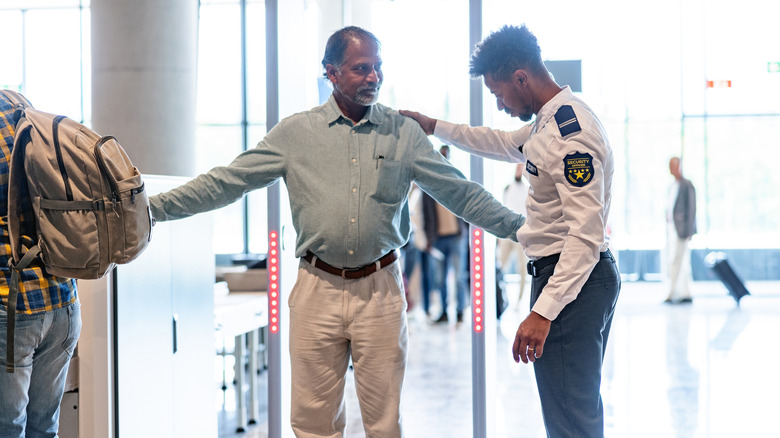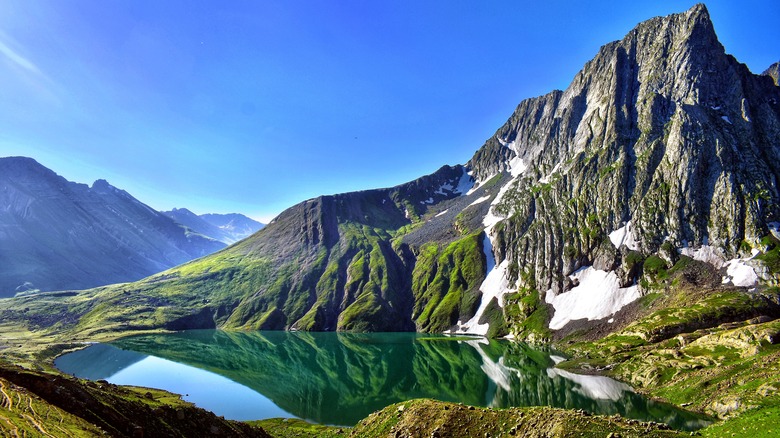The Very Popular Hiking Device You Can Get Arrested Just For Having On You While In India
For better or for worse, it is always the traveler's responsibility to behave appropriately and follow the local rules and customs of a different country, whether following the swimsuit law in France or packing clothing for a week in Shanghai. If you plan to visit India, national security is a sensitive and serious issue, especially regarding electronic communications. Travelers should triple-check their belongings for satellite phones or GPS devices and ensure they are being left at home, as they are banned under the country's Wireless Telegraphy Act of 1933. India strengthened the interpretation of this law after terrorist attacks in Mumbai in 2008, where the criminals used GPS devices to map and pinpoint specific targets with coordinates, and satellite phones to communicate with one another before the attack.
In the past four months, at least four travelers from multiple countries, including the United States, Canada, and the Czech Republic have been arrested at different airports across India for possessing satellite communication and GPS devices and breaking the Wireless Telegraphy Act. Despite the travelers being genuine tourists, India did not slap them on the wrist after they were caught. The travelers were detained, interrogated by the police, and given a notice to appear, with one traveler paying thousands of dollars for bail.
Based on my personal experience, security at Indian airports can be notoriously strict — and slow. When flying from Hyderabad, Goa, and Chennai I had to go through twice (before and after check-in) and separate and empty the contents of my carry-on into plastic bins where security officers scanned the empty bag and thoroughly checked each electronic and metal item individually, including a metal pen to make sure it was safe.
What to pack instead
From the towering peaks of Kashmir to the gorgeous, sun-drenched beaches of Kerala, India beckons for adventures unlike anywhere else on earth. You are likely to have unforgettable experiences as each step of your journey further immerses you in the country's diverse people, foods, temples, and cultural heritage.
One of the most important pieces of gear you will need for a trip to India is an unlocked mobile phone. Your phone will be a lifesaver in helping you get around with Google Maps and find transportation through Uber, though be careful of the sneaky dangers of ride sharing apps. Note that you may have trouble keeping in touch and getting a local SIM card. Depending on when and where you arrive in India, you will likely have to jump through multiple hoops to get a local SIM. One alternative is to purchase an eSIM before leaving home so you can be in touch as soon as you arrive. Many public locations and Starbucks in India have WiFi, but they require a local phone number to access.
Moreover, more so than in the West, being a respectful and kind traveler is key when walking on the streets or visiting temples. Be sure to dress appropriately and don't forget about India's different bathroom and hygiene habits, where the left hand is considered "unclean" and only used for cleaning dirty parts of your body. Pack hand sanitizer and tissues as you may not find soap or toilet paper in public restrooms. Adjusting to India's different local languages and writing systems, fragrant smells, and a constant, pulsating energy requires major adjustments. That being said, overcoming these challenges is truly worth the inspiration and lessons you'll take home.
Hiking off the beaten path in India
Whether you are going to India, Switzerland, Nepal, or Colorado, off-the-beaten-path hiking trips require large amounts of planning and preparation. Packing the correct hiking gear for a multi-day hike will not only better ensure your safety, it will also make your trip more comfortable and memorable. You'll feel at ease as you take in the splendid vistas and rugged peaks and build a deeper connection with nature and yourself.
Even though a solo hiking or backpacking trip — especially to a foreign country — can be life-changing, it is always a good idea to avoid these common mistakes that can jeopardize your safety. Be sure to plan your route well, especially if it will brush up near international borders. This may not be as much of a problem in the Alps in countries such as Switzerland, France, and Italy, however, it could be a massive one in the Himalayas. Hiking in Kashmir would add significantly more risk as it is not only remote, but claimed by India, China, and Pakistan. If you explore some of the earth's best treks, be sure to find a trustworthy local guide who knows the routes, can help you fully prepare for the hike, and can serve as a bridge between you and the local culture in case there are misunderstandings.
Finally, it's always a good idea to write down the 24-hour emergency phone number for your country's embassy or consulate before you leave home. They can help you replace a lost passport abroad, contact loved ones back home, and provide lists of local English-speaking medical and legal professionals if you are in serious trouble. If worse comes to worst, having this number handy will mean one less major thing to worry about on the road.


